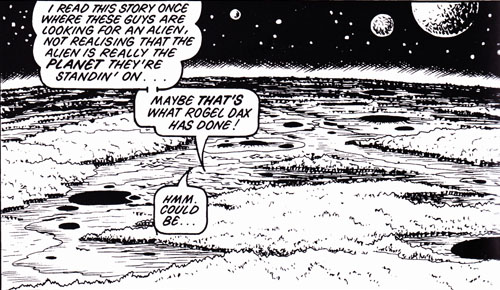One of the regular features of 2000AD was the Future Shocks, usually two to four pages in length, they were done-in-one tales, almost always having a twist in the tail, and often used for new and aspiring writers as well as the more established.
The weekend just gone, I picked up this little beauty:
All (well, most) of Alan Moore's 2000AD Future Shocks in one volume, along with his Time Twister stories - another type of short story that featured, as you can probably guess, time travel as it's theme.
Reading through the stories, I was surprised at how many of them I'd read at the time without being aware that I was looking at the early work of someone who would later become one of my favourite authors. Tastes change, however, and after my original reading of these stories in the early 80's, I moved on to horror, particularly another giant in his field, Stephen King.
Throughout the 80's and into the 90's I devoured King's books, going so far as to track down numerous first editions - prize of my collection is a first edition of The Shining in near mint condition, along with a first edition paperback of The Running Man by Richard Bachman with not a mention of Mr King anywhere. Amongst his novels, King has produced several short story collections, the first being Night Shift from 1978.
My memory's not what it was, sadly, but when I read The Complete Alan Moore Future Shocks this week, it did it's job.
In King's Night Shift there's a story called Trucks which first appeared in 1973. Here's the plot summary from Wikipedia's article:
"The story's narrator and a handful of strangers find themselves trapped together in a freeway truck stop diner after semi-trailers and other electronic devices are suddenly brought to independent life by an unknown force and proceed to gruesomely kill every human in sight. The survivors hiding in the diner include the narrator, a counterman, a trucker, a young man named Jerry, his girlfriend, and a salesman named Snodgrass. As the story begins, Snodgrass cracks under the strain, attempts to flee across the stop's parking lot and is knocked into a drainage ditch, taking hours to die. The situation worsens when the diner's power goes out, and the narrator's attempt to collect any available drinking water ends in near-disaster, but then a note of hope appears when the trucks begin to run out of gas. An enormous semi-truck noses up to the diner and demands, via morse code blasts from its horn, that the humans start pumping fuel. The narrator is out-voted when he suggests they comply with this, and a bulldozer arrives and proceeds to attack the diner. The narrator and Jerry destroy the dozer with improvised Molotov cocktails, but the diner is half-destroyed and Jerry and the trucker are killed. The remaining three humans surrender and, taking turns, start pumping the gas into the mile-long string of waiting trucks. As he toils, the narrator thinks that perhaps this will last only until the trucks rust and fall apart, but he then has a grim vision of forced assembly lines churning out new generations of trucks, and the entire world flattened out and remade in its new masters' image. The story ends as a pair of planes fly overhead, and the narrator laments that they probably are unmanned."And here's Moore's two-page story called All of Them Were Empty which first appeared in 1982:
Apart from the obvious idea of trucks becoming autonomous through one means or another, there's a number of similarities: the story takes place in a diner/truck-stop; one character snaps under the pressure and bolts early on; the vehicles are referred to as trucks rather than the British "lorries"; there's mention of a bulldozer.
I found a couple of references on the net to the similarities between the two stories including one forum where someone states:
"As I undertand it, "Killer in the Cab" and "The Dating Cab [sic]" were not reprinted in The Complete Future Shocks of Alan Moore because he felt he plagiarized the stories."and someone else replies:
"Guess he overlooked "All of Them Were Empty" although I don't see how, given that Stephen King's "Trucks" went on to become such an unforgettably bad movie"so I'm not claiming any new insight here, nor am I pointing fingers at Moore - writers are always, to some degree or another, influenced by other stories. However, if Moore thought that two of his tales (Killer in the Cab and The Dating Game) were too close to their source material, it does surprise me that All of Them Were Empty made it to the collection.
Just to wrap up, there's a wonderful example of the germ of an idea being dropped into a story before appearing in full years later. In The Bounty Hunters, we find the titular incompetent hunters searching for Rogel Dox, a shapeshifter who can look like anything, whereupon one of the hunters says:
This was also in 1982, a full three years before this:






No comments:
Post a Comment
Thanks for wanting to leave a comment, but this blog is no longer maintained. Feel free to visit my new site/blog over at
crisisonearthprime.com
Look forward to seeing you there. :)